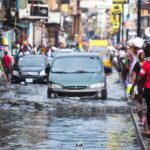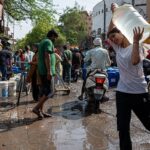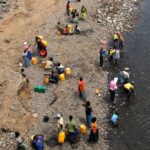Posts tagged with 'water access'
In the heart of Nairobi’s Mathare slums, a quiet but powerful revolution is growing – one plant at a time. Teenage mothers, often marginalized and overlooked, are transforming their lives and their community through urban farming and organizing. Their efforts ...

Extreme weather events like floods and droughts are becoming more frequent and intense around the globe, disrupting communities and the infrastructure they rely on. In 2024 alone, the world endured 58 disasters that wreaked over a billion dollars in damages each. Yet ...

Africa’s cities, from large metropolises to smaller towns, are increasingly characterized by growing urban sprawl. Kinshasa, Democratic Republic of Congo, is expanding by about 2,000 people and 5 hectares (10 football fields) every day, according to a World Bank estimate. Kumasi, an intermediary ...

For the 21 million residents of Lagos, Nigeria, climate change is not a distant concept — it is a current reality. Over the past decade, the city has experienced devastating floods, exacerbated by the loss of over half of its wetlands ...

Moldova’s capital city, Chișinău, recently secured a €20 million investment to tackle flooding and pollution of the Bîc River, aiming to transform it into a valuable recreational amenity for 100,000 residents and mitigate future flood risks. This funding, which combines loans from ...

In a time of polycrises – from economic and political instability to health and environmental emergencies – water is a resource that cannot be relegated to the background. Especially in urban environments, water demand is ever-increasing and in too many ...

Cities are not just places where people live—they are interconnected networks of people, services and economic activity. A city is a system of systems, bringing together transportation, energy, buildings, water, waste management and more. Transforming these interconnected systems is vital ...

The world recently experienced a 13-month streak of record-breaking global temperatures. And as blistering heat waves punish communities across several continents, 2024 is on track to be the hottest year on record. Global average temperatures are now perilously close to exceeding 1.5 ...

On the eastern edge of Buenos Aires, residents of the Rodrigo Bueno neighborhood take a break from pick-up soccer games and stretch out on grassy knolls. Further down the road, a kitchen buzzes with locals testing new recipes to feature ...

In the crowded slums of Zambia, Africa, members of the Zambia Youth Federation, a social movement of the urban poor, conducted climate change research and presented it in an emotional spoken word poem. Their message let policymakers know how climate ...

The Guacheneque Páramo, where the Bogotá River originates, represents the second largest source of drinking water for the city of Bogotá, Colombia. It is a key ecosystem that supplies water to approximately 25% of the city’s 7 million inhabitants. However, due to ...

New data from WRI’s Aqueduct Water Risk Atlas show that 25 countries — housing one-quarter of the global population — face extremely high water stress each year, regularly using up almost their entire available water supply. And at least 50% of the ...

India is projected to overtake China as the most populous country in the world this year. The shifting demographics are bound to create heightened demand for education, health care, jobs and civic amenities, putting existing systems under stress. Current urban ...

We now have less than seven years to cut emissions in half in order to keep global warming below 1.5 degrees C, the limit scientists say is necessary for averting some of the most dangerous climate impacts. 2022 saw flooding, drought and severe ...

The latest UN climate conference, COP27 in Sharm el Sheikh, Egypt, was a significant one for cities in many respects. Delegates established a new fund to help vulnerable countries deal with loss and damages from climate impacts, and some of ...


























